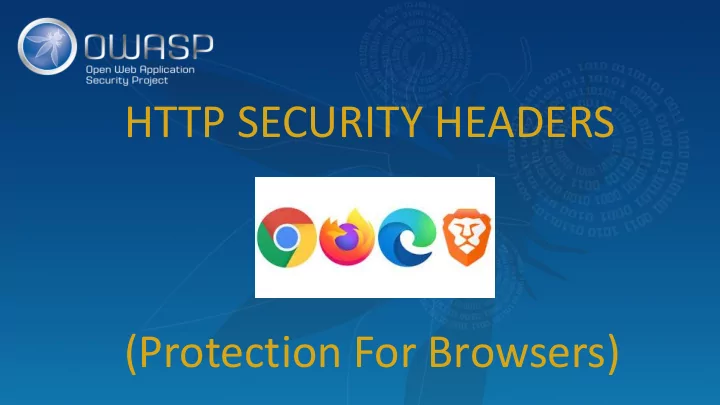

HTTP SECURITY HEADERS (Protection For Browsers)
BIO • Emmanuel JK Gbordzor ISO 27001 LI, CISA, CCNA, CCNA- Security, ITILv3, … 11 years in IT – About 2 years In Security Information Security Manager @ PaySwitch Head, Network & Infrastructure @ PaySwitch Head of IT @ Financial Institution Bug bounty student by night – 1 st Private Invite on Hackerone
Introduction • In this presentation, I will introduce you to HyperText Transfer Protocol (HTTP) response security headers. • By specifying expected and allowable behaviors, we will see how security headers can prevent a number of attacks against websites. • I’ll explain some of the different HTTP response headers that a web server can include in a response, and what impact they can have on the security of the web browser. • How web developers can implement these security headers to make user experience more secure
A Simple Look At Web Browsing
Snippet At The Request And Response Headers
Browser Security Headers help: ➢ to define whether a set of security precautions should be activated or Why deactivated on the web browser. ➢ to reinforce the security of your web Browser browser to fend off attacks and to mitigate vulnerabilities. Security ➢ in fighting client side (browser) attacks such as clickjacking, Headers? injections, Multipurpose Internet Mail Extensions (MIME) sniffing, Cross-Site Scripting (XSS), etc.
Content / Context HTTP STRICT X-FRAME-OPTIONS EXPECT-CT TRANSPORT SECURITY (HSTS) CONTENT-SECURITY- X-XSS-PROTECTION X-CONTENT-TYPE- POLICY OPTIONS
HTTP Strict Transport Security (HSTS) • HSTS header forces browsers to communicate using secure (HTTPS) connection. • Protects against “downgrade attacks” • When configured with the “Preload” option, it can prevent Man-In-The-Middle (MiTM) attack • “Preload” - https://hstspreload.org/ - from google
HTTP Redirection To HTTPS
HTTP Redirection To HTTPS - Continued
HTTP Strict Transport Security (HSTS) - Implementation Syntax: Strict-Transport-Security: max-age=<expire-time> includeSubDomains preload Apache: Header set Strict-Transport-Security "max- age=31536000; includeSubDomains; preload“ Nginx: add_header Strict-Transport-Security 'max-age=31536000; includeSubDomains; preload'; Microsoft IIS: Name: Strict-Transport-Security Value: max-age=31536000; includeSubDomains; preload
X-Frame- Options • An iFrame is an element that allows a web app to be nested within a parent web app. • Can be used maliciously for a clickjacking attack or loading a malicious website inside the frame Prevention: • Frame busting • X-Frame-Option Header
X-Frame-Options - Implementation Syntax: X-Frame-Options: deny sameorigin allow-from url (deprecated) Apache: Header always set X-Frame- Options “deny” Nginx: add_header X-Frame- Options “DENY”; WordPress: header('X-Frame-Options: DENY); Microsoft IIS: Name: X-Frame-Options Value: DENY
Expect-CT • HTTP Public Key Pinning (HPKP) header is being deprecated to Expect-CT • Expect-CT detects certificates issued by rogue Certificate Authorities (CA) or prevents them from doing so • This header prevents MiTM attack against compromised Certificate Authority (CA) and rogue issued certificate
Expect-CT - Implementation Syntax: Expect-CT: max-age enforce report-uri Apache: Header set Expect-CT 'enforce, max-age=86400, report- uri="https://foo.example/report“’ Nginx : add_header Expect-CT 'max-age=60, report-uri="https://mydomain.com/report"';
Content-Security-Policy (CSP) This header helps you to whitelist sources of approved content into your browser hence, preventing the browser from loading malicious assets. This helps prevents XSS, clickjacking, code injection, etc., attacks When this header is well implemented, there is no need to implement “X -Frame- Options” and “ X-XSS- Protection” headers
Content-Security-Policy - Directives Keywords: * , none, self, hosts Content-Security-Policy: default-src Serves as a fallback for the other fetch directives font-src Specifies valid sources for fonts loaded frame-src Sources for nested contexts such as <frame> and <iframe> img-src Sources of images and favicons media-src Valid sources for loading <audio>, <video> & <track> object-src Sources for the <object>, <embed> and <applet> elements script-src Specifies valid sources for JavaScript style-src Specifies valid sources for stylesheets report-uri Reports violations
CSP Sample - https://haveibeenpwned.com content-security-policy: default-src 'none';script-src 'self' www.google-analytics.com www.google.com www.gstatic. js.stripe.com ajax.cloudflare.com;style-src 'self' 'unsafe-inline' cdnjs.cloudflare.com;img-src 'self' www.google-analytics.com stats.g.doubleclick.net www.gstatic.com;font-src 'self' cdnjs.cloudflare.com fonts.gstatic.com;base-uri 'self';child-src www.google.com js.stripe.com;frame-ancestors 'none';report-uri https://troyhunt.report- uri.com/r/d/csp/enforce .com/en_US/i/scr/pixel.gif;"
X-XSS- Protection These header detect dangerous HTML input and either prevent the site from loading or remove potentially malicious scripts
X-XSS-Protection - Implementation Syntax: X-XSS-Protection: 0 1 mode=block Apache: Header set X-XSS- Protection "1; mode=block“ Nginx: add_header X-XSS-Protection "1; mode=block"; Microsoft IIS: Name: X-XSS-Protection Value: 1; mode=block
X-Content-Type-Options • For your seamless experience on the web, MIME sniffing of resource was introduced. • Adversely, an attacker can introduce a malicious executable script such as an image. When acted on by MIME sniffing could have the script executed.
X-Content-Type-Options - Implementation Syntax: X-Content-Type-Options: nosniff Apache: Header set X-Content-Type-Options nosniff Nginx: add_header X-Content-Type-Options nosniff; Microsoft IIS: Name: X-Content-Type-Options Value: nosniff
– Clickjacking – iFrame injection – Harlem shake Demo Time https://127.0.0.1/mutillidae/
Takeaways • Enforce HTTPS using the Strict-Transport-Security header and add your domain to Chrome’s preload list. • Make your web app more robust against XSS by leveraging the X-XSS- Protection header. • Block clickjacking using the X-Frame-Options header. • Leverage Content-Security-Policy to whitelist specific sources and endpoints. • Prevent MIME-sniffing attacks using the X-Content-Type-Options header.
Resources / Tools • Check Website HTTP Response Header – https://gf.dev/http-headers-test • Secure Headers Test – https://gf.dev/secure-headers-test • Scott Helme – Security Header Scanner – https://securityheaders.com • HTTP Headers Reference – https://developer.mozilla.org/en-US/docs/Web/HTTP/Headers • HTTP Compatibility Among Browsers – https://caniuse.com
References • https://www.netsparker.com/whitepaper-http- security-headers • https://www.ntu.edu.sg/home/ehchua/programming/ webprogramming/HTTP_Basics.html • https://owasp.org/www-chapter-ghana/#div- pastevents • https://www.keycdn.com/blog/http-security-headers
THANK YOU Questions And Answers Let’s Connect: @egbordzor linkedin.com/in/egbordzor egbordzor@protonmail.com
Recommend
More recommend